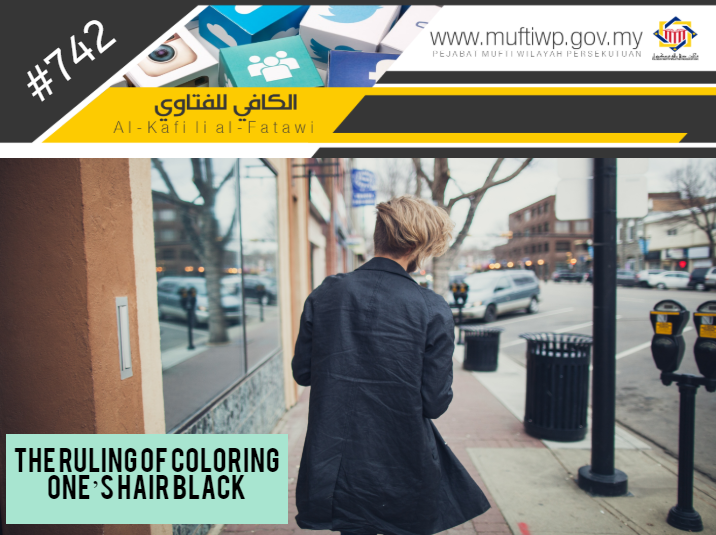Question:
Assalamualaikum SS Dato’ Seri Mufti. I hope that you are always in great health and the blessings of Allah SWT:
Here, I have a fiqh question. I hope to get an explanation from you. I am 32 years old, but I have a serious grey hair problem. Is it permissible for me to colour my hair with black hair colour/ henna? Some ustaz advised me to color my hair with the normal reddish henna, but I am embarrassed to color my hair red because I work in a school and it may be awkward to have red-colored hair while being among the students. I hope that you could answer my question.
Answer:
Alhamdulillah, praise and thanks to Allah for the countless blessings He has blessed us all with. Blessings and salutations to the Prophet Muhammad PBUH, his wives, his family, companions and all those that follow his teachings to the day of judgement.
In this issue, we cite the statement of the author of al-Fiqh al-Manhaji:
“It is prohibited for a man and a woman to colour their beard or hair black. However, it is sunnah to colour grey hairs with other colours such as yellow or red.”
This is in accordance with a hadith from Jabir RA, where he said: Abu Quhafah (Abu Bakar’s father; his real name is Uthman and he embraced Islam during the conquest of Mecca) whose hair is as white as a frangipani flower (الثغامة), is brought to the Prophet PBUH during the conquest of Mecca, then the Prophet PBUH, the Prophet PBUH said:
غَيِّرُوا هَذَا بِشَىْءٍ وَاجْتَنِبُوا السَّوَادَ
“Change this with something, but avoid black.”
Sahih Muslim (2102)
And a hadith from Abu Hurairah RA, the Prophet PBUH said:
غَيِّرُوا الشَّيْبَ وَلاَ تَشَبَّهُوا بِالْيَهُودِ
“Change grey hair, but do not imitate the Jews.”
Sunan al-Tirmizi (1752)
The same is stated in another hadith from Abu Hurairah RA, where the Prophet PBUH said:
إِنَّ الْيَهُودَ وَالنَّصَارَى لاَ يَصْبُغُونَ، فَخَالِفُوهُمْ
“Jews and Christians do not dye their hair so you should do the opposite of what they do.”
Sahih al-Bukhari (5559) and Sahih Muslim (2103)
The act of coloring one’s grey hairs back to black is a form of deception and changing the real physical appearance of someone. By coloring one’s hair black, an adult may seem as if he is an adolescent and an old man may appear younger; changing people’s perception towards him. This will result in a different assumption of people towards him from who he really is. As for coloring it to other colours, it is not a form of deception, falsehood or changing oneself.
This is the opinion of madhab al-Syafie. Whereas, in madhab Maliki, Hanafi and Hanbali, coloring one’s hair black is makruh (undesirable) and it is permissible during wars. Imam Abu Yusuf, a Hanafiyyah scholar grouped it among those of absolute permissibility. Refer al-Mausu`ah al-Fiqhiyyah al-Kuwaitiyyah(2/281).
Imam al-Syaukani said:
“Some scholars (salaf scholars) coloured their hair black. It is narrated that this practice is from (the companions such as) Uthman (bin ‘Affan), al-Hasan and al-Hussein; sons of (Ssaidina) Ali, ‘Uqbah bin ‘Amir and Ibn Sirin, Abu Burdah and others.” Refer to Nail al-Autar (2/281)
Prof Dr Yusuf al-Qaradhawi in his book al-Halal wa al-Haram fi al-Islam (pg. 117) said:
“While for those who are not as old as Abu Quhafah, it is permissible to color their hair black. In this case, al-Zuhri (a tabien) said: We color our hair black if we are still young. When one’s face is wrinkled and teeth are loose, then we leave it.”
In our opinion, if someone wants to color their hair, then he should color it with colors other than black; of which is appropriate of a person being a Muslim. This is to celebrate madhab al-Syafie, which is the madhab practised in Malaysia. However, we do not deny other opinions that ruled it makruh (undesirable) or even permissible, especially if it is not a form of deception. As for the concern that the questioner has regarding the awkwardness and the perception of students, it should not lead to fitnah if a correct explanation is made to the students about the rulings of coloring hair according to syarak.
However, if the questioner is a woman, then it is obligatory for her to cover her hair, for her hair is aurah and adornment that is obligatory to be covered.
Wallahua’lam.


